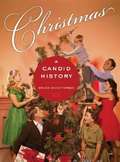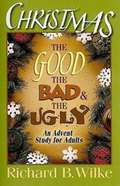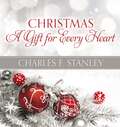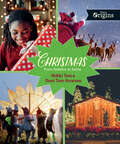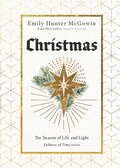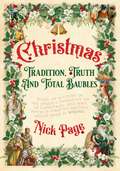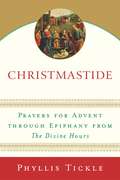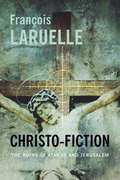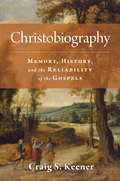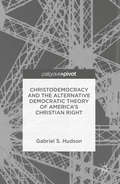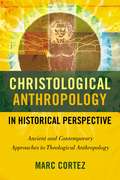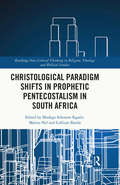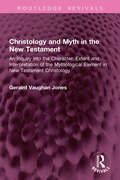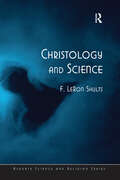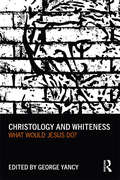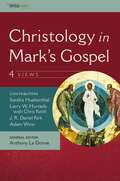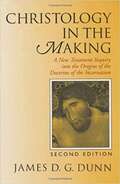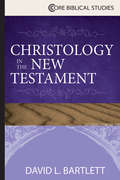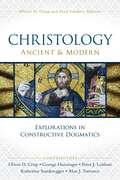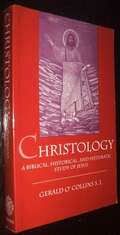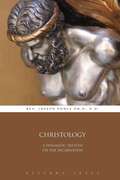- Table View
- List View
Christmas: A Candid History
by Bruce David ForbesThe book provides an enlightening, entertaining perspective on how the annual Yuletide celebration got to be what it is today. In a fascinating, concise tour through history, it tells the story of Christmas--from its pre-Christian roots, through the birth of Jesus, to the holiday's spread across Europe into the Americas and beyond, and to its mind-boggling transformation through modern consumerism.
Christmas: An Advent Study for Adults
by Richard B. WilkeIn this four-week Advent study, author Richard B. Wilke focuses on people in the story of Christ’s birth. There are those we associate with the joy and celebration of Christmas—the wise men, the shepherds, and Joseph. Yet the author reminds us not to forget that the evil King Herod is also part of the Christmas story, and how it is because there is evil in our world that we so desperately needed—and need—a Savior.Each lesson includes a key scripture, brief reflection, questions to discuss, a suggested Christmas carol, and a prayer.Table of Contents:First Week of AdventLet’s Keep Herod in Christmas (Matthew 2:1, 7-8, 16-18)Second Week of AdventLet’s Keep the Wise Men in Christmas (Matthew 2:1-12)Third Week of AdventLet’s Keep Joseph in Christmas (Matthew 1:18-25; 2:13-15, 19-23)Fourth Week of AdventLet’s Keep the Shepherds in Christmas (Luke 2:8-20)
Christmas: Finding Peace and Joy During the Holiday Season
by Charles F. StanleyBeloved pastor Dr. Charles Stanley takes us back to our truest and best reason for celebration—the birth of Christ. By revisiting the people and events of that first Christmas, Dr. Stanley reveals the unique lessons that long-ago starry night offers to each of us today. Such timeless truths as . . .true peace and joy are found only in Christ, not in the things of this world;Christmas itself is undeniable evidence that God always keeps His promises;the Lord God not only lives and reigns, but He is intimately involved in every circumstance of our lives; andthe perfect gift for us to give Jesus is the gift of our own heart.Christmas is a gift to everyone on earth. That gift has different meaning to God—Christ&’s birth was His perfect plan that unfolded in His perfect time. This message is followed by a celebration of who Jesus is—God came down, reigning King, suffering Servant, Savior of the world—and the lessons learned through His birth from the perspectives of:Mary, the virgin motherJoseph, faithful and obedient servant of Godthe innkeeper who had no vacancythe townspeople who were indifferent to what was happening around themthe wise men who, by faith, followed the star and brought gifts of genuine worship and adorationand Isaiah, looking for the wonderful counselorChristmas: A Gift for Every Heart is a highly designed Christmas gift book with beautiful callouts, Dr. Stanley&’s own personal thoughts and memories, Scripture, and four-color photography. This will be a treasured gift for Advent and Christmas that will be read again and again.
Christmas: From Solstice to Santa (Orca Origins #6)
by Nikki Tate Dani Tate-StrattonChristmas is a popular holiday celebrated by people all over the world. This informative and engaging exploration of Christmas is aimed at the middle grades but will entertain readers of a much wider age range. Learn about the games played, foods eaten, music played and favorite ways of decorating in different parts of the world. With lots of fun facts (about everything from frumenty to the jolly old man in red himself) and recipes, there's plenty in this beautifully illustrated volume to satisfy anyone with an interest in the festive season.
Christmas: On This Holy Night
by Thomas NelsonA collection of inspirational thoughts combined with a sophisticated design to celebrate the holiest of nights.This beautiful gift book will make its way into your heart and your Christmas decor year after year. Well-loved verses from Luke intermingled with quotes from influential Christians, both past and present. Share thoughts such as "The Son of God became a man to enable men to become the sons of God" from C. S. Lewis or these lines from Christina Rossetti: "Love came down at Christmas, Love all lovely, love divine. Love was born at Christmas; Star and angels gave the sign."
Christmas: The Season of Life and Light (The Fullness of Time)
by Emily Hunter McGowin"O wondrous exchange!" Of all the seasons of the church calendar, Christmas is the one most recognized and celebrated by our society at large. That means it's the season we're most familiar with—but that can also make it harder to see past Christmas's many cultural trappings to its timeless beauty. At the first Christmas, God exchanged the glories of divinity for the vulnerability of human existence, uniting himself to us in order to unite us to God. In this short volume, priest and theologian Emily Hunter McGowin invites us into the church's celebration of that great exchange, in all its theological and liturgical splendor. Each volume in the Fullness of Time series invites readers to engage with the riches of the church year, exploring the traditions, prayers, Scriptures, and rituals of the seasons of the church calendar.
Christmas: Tradition, Truth and Total Baubles
by Nick PageWhy is Christmas the way it is? How did we get from the birth of Jesus to everyone pushing their credit card and their belts to their maximum extent? Starting with the events surrounding Jesus' birth, this book takes us through centuries of commemoration, celebration and over-consumption. Along the way we'll find out why we eat turkey, how an obscure Turkish saint turned into a man flying a sleigh, and why that tree in your house should really contain an apple and a snake. Combining in-depth historical research, cheerfully irreverent humour and cutting-edge guesswork, Nick Page explores what this festival really means, and how we can get back to something real and true beneath all that wrapping.
Christmas: Tradition, Truth and Total Baubles
by Nick PageWhy is Christmas the way it is? How did we get from the birth of Jesus to everyone pushing their credit card and their belts to their maximum extent? Starting with the events surrounding Jesus' birth, this book takes us through centuries of commemoration, celebration and over-consumption. Along the way we'll find out why we eat turkey, how an obscure Turkish saint turned into a man flying a sleigh, and why that tree in your house should really contain an apple and a snake. Combining in-depth historical research, cheerfully irreverent humour and cutting-edge guesswork, Nick Page explores what this festival really means, and how we can get back to something real and true beneath all that wrapping.
Christmastide: Prayers for Advent Through Epiphany from The Divine Hours
by Phyllis Tickle"A welcome remedy for the increasing number of lay Christians who have rediscovered the daily offices. Tickle puts each day's prayers, psalms, readings, and refrains-everything you need-in one place. The rhythm that Tickle's book establishes gives one a stronger sense of participating in an ancient, worldwide but very personal liturgy. " -Nora Gallagher, "beliefnet. com, and author of "Things Seen and Unseen: A Year Lived in Faith The third and final volume in a trilogy of prayer manuals compiled by "Publishers Weekly religion editor Phyllis Tickle as a contemporary Book of Hours to guide Christians gently yet authoritatively through the daily offices. "The Divine Hours is the first major literary and liturgical reworking of the sixth-century Benedictine Rule of fixed-hour prayer. This beautifully conceived and thoroughly modern three-volume guide will appeal to the theological novice as well as to the ecclesiastical sophisticate. Making primary use of the Book of Common Prayer and the writings of the Church Fathers, "The Divine Hours is also a companion to the New Jerusalem Bible, from which it draws its Scripture readings. The trilogy blends prayer and praise in a way that, while extraordinarily fresh, respects and builds upon the ancient wisdom of Christianity. The third and final book in the set, "Prayers for Springtime, provides prayers, psalms, and readings for this season associated with rebirth. Compact, with deluxe endpapers, it is perfect for those seeking greater spiritual depth. As a contemporary Book of Hours, "The Divine Hours: Prayers for Springtime heralds a renewal of the tradition of disciplined daily prayer, and gives those already using the first twovolumes the completion they are seeking. With this volume, the series culminates with three prayer manuals encompassing the liturgical and calendar year with the offices for every day. "From the Hardcover edition.
Christo-Fiction
by Robin Mackay François LaruelleFrançois Laruelle's lifelong project of "nonphilosophy," or "nonstandard philosophy," thinks past the theoretical limits of Western philosophy to realize new relations among religion, science, politics, and art. In Christo-Fiction, Laruelle targets the rigid, self-sustaining arguments of metaphysics, rooted in Judaic and Greek thought, and the radical potential of Christ, whose "crossing" disrupts their circular discourse. Laruelle's Christ is not the authoritative figure conjured by academic theology, the Apostles, or the Catholic Church. He is the embodiment of generic man, founder of a science of humans, and the herald of a gnostic messianism that calls forth an immanent faith. Explicitly inserting quantum science into religion, Laruelle recasts the temporality of the cross, the entombment, and the resurrection, arguing that it is God who is sacrificed on the cross so that equals in faith may be born. Positioning itself against orthodox religion and naive atheism alike, Christo-Fiction is a daring, heretical experiment that ties religion tightly to the human experience and the lived world.
Christo-Fiction: The Ruins of Athens and Jerusalem (Insurrections: Critical Studies in Religion, Politics, and Culture)
by François LaruelleFrançois Laruelle's lifelong project of "nonphilosophy," or "nonstandard philosophy," thinks past the theoretical limits of Western philosophy to realize new relations between religion, science, politics, and art. In Christo-Fiction Laruelle targets the rigid, self-sustaining arguments of metaphysics, rooted in Judaic and Greek thought, and the radical potential of Christ, whose "crossing" disrupts their circular discourse. Laruelle's Christ is not the authoritative figure conjured by academic theology, the Apostles, or the Catholic Church. He is the embodiment of generic man, founder of a science of humans, and the herald of a gnostic messianism that calls forth an immanent faith. Explicitly inserting quantum science into religion, Laruelle recasts the temporality of the cross, the entombment, and the resurrection, arguing that it is God who is sacrificed on the cross so equals in faith may be born. Positioning itself against orthodox religion and naive atheism alike, Christo-Fiction is a daring, heretical experiment that ties religion to the human experience and the lived world.
Christobiography: Memory, History, and the Reliability of the Gospels
by Craig S. KeenerDemonstrates the reliability of the canonical gospels by exploring the genre of ancient biographyThe canonical gospels are ancient biographies, narratives of Jesus’s life. The authors of these gospels were intentional in how they handled historical information and sources.Building on recent work in the study of ancient biographies, Craig Keener argues that the writers of the canonical gospels followed the literary practices of other biographers in their day. In Christobiography he explores the character of ancient biography and urges students and scholars to appreciate the gospel writers’ method and degree of accuracy in recounting the ministry of Jesus. Keener’s Christobiography has far-reaching implications for the study of the canonical gospels and historical-Jesus research.Table of Contents:Introduction Part 1. Biographies about Jesus 2. Not a Novel Proposal 3. Examples and Development of Ancient Biography 4. What Sort of Biographies Are the Gospels? 5. What Did First-Century Audiences Expect of Biographies? Part 2 Biographies and History 6. Biographies and Historical Information 7. What Historical Interests Meant in Antiquity 8. Luke-Acts as Biohistory 9. Sources Close to the Events Part 3. Testing the Range of Deviation 10. Case Studies: Biographies of Recent Characters Use Prior Information 11. Flex Room: Literary Techniques in Ancient Biographies Part 4. Two Objections to Gospels as Historical Biographies 12. What about Miracles? 13. What about John? Part 5. Memories about Jesus: Memories before Memoirs 14. Memory Studies 15. Jesus Was a Teacher 16. Oral Tradition, Oral History 17. The Implications of This Study
Christodemocracy and the Alternative Democratic Theory of America's Christian Right
by Gabriel S. HudsonThis book evaluates the democratic theory of America's Christian Right (CR). The CR has been examined extensively in academic literature. However, most analyses focus on its origins, policy preferences, or successful mobilization. Hudson instead examines the normative assumptions about governance that inform CR activism. The CR has its own answers to the core questions asked in democratic theory, such as "What legitimizes power?" and "What is the proper relationship between the state and the individual?" The author outlines ten normative assumptions of the CR and compares each to its counterpoint in liberal democratic theory. Much of what the CR believes about democracy comes from the same authors as modern and postmodern democratic theory but differs in its interpretation and application. The book describes in detail the theory of CR and demonstrates how the CR operates from a different view of governance than is usually associated with the United States.
Christological Anthropology in Historical Perspective: Ancient and Contemporary Approaches to Theological Anthropology
by Marc CortezWhat does it mean to be “truly human?” In Christological Anthropology in Historical Perspective, Marc Cortez looks at the ways several key theologians—Gregory of Nyssa, Julian of Norwich, Martin Luther, Friedrich Schleiermacher, Karl Barth, John Zizioulas, and James Cone—have used Christology to inform their understanding of the human person. Based on this historical study, he concludes with a constructive proposal for how Christology and anthropology should work together to inform our view of what it means to be human. Many theologians begin their discussion of the human person by claiming that in some way Jesus Christ reveals what it means to be “truly human,” but this often has little impact in the material presentation of their anthropology. Although modern theologians often fail to reflect robustly on the relationship between Christology and anthropology, this was not the case throughout church history. In this book, examine seven key theologians and discover their important contributions to theological anthropology.
Christological Paradigm Shifts in Prophetic Pentecostalism in South Africa (Routledge New Critical Thinking in Religion, Theology and Biblical Studies)
by Marius Nel Mookgo Solomon Kgatle Collium BandaThis book explores recent developments in South African Pentecostalism, focusing on new prophetic churches. The chapters engage with a number of paradigm shifts in Christology, identified as complementing Christ, competing with Christ, removing Christ and replacing Christ. What are the implications of these shifts? Does it mean that believers no longer believe in Christ but in their leaders? Does it shift believers’ faith towards materiality than the person of Christ? This volume will be valuable for scholars of African Christianity and in particular those interested in the neo-prophetic movement and Christology in a South African context.
Christology and Myth in the New Testament: An Inquiry into the Character, Extent and Interpretation of the Mythological Element in New Testament Christology (Routledge Revivals)
by Geraint Vaughan JonesChristology and Myth in the New Testament (1956) enquires into the extent and origin of the ‘mythological’ language and ideas underlying the Christology of the New Testament. It examines the ‘demythologizing’ principles, and refers to the ‘existential’ method of reinterpreting those New Testament concepts which are bound up with Hellenistic thought-forms and the cosmology of the ancient world while also exploring other philosophical and theological interpretations. It considers that the ‘mythical’ Christology of the New Testament writers should be understood poetically and metaphorically rather than as consisting of objective statements about Jesus and his place in creation. The final section of the book is a defence of the retention of ‘mythical’ concepts and language as psychologically and theologically necessary expressions of a religious faith which cannot be adequately expressed in merely propositional form.
Christology and Science (Routledge Science and Religion Series)
by F. LeRon ShultsThe dialogue between theology and science has blossomed in recent decades, but particular beliefs about Jesus Christ have not often been brought to the forefront of this interdisciplinary discussion even in explicitly Christian contexts. This book breaks new ground by explicitly bringing the specific themes of Christology into dialogue with contemporary science. It engages recent developments in late modern philosophy of science in order to articulate the Christian beliefs about Jesus Christ in a way that responds to challenges and opportunities that have arisen in light of various scientific discoveries. The main chapters deal with Incarnation, Atonement and Parousia. After a brief treatment of the history of the shaping of these ideas, the author traces developments in some of the sciences that have challenged these formulations: evolutionary biology, cultural anthropology and physical cosmology. Each chapter also summarises some of the popular constructive responses to these developments. After clarifying the way in which the Christian understanding of God and of humanity shape the task of reforming Christology, each chapter concludes with a programmatic outline of ways in which we might articulate the identity, agency and presence of Jesus Christ in dialogue with late modern science and culture.
Christology and Whiteness: What Would Jesus Do?
by George YancyThis book explores Christology through the lens of whiteness, addressing whiteness as a site of privilege and power within the specific context of Christology. It asks whether or not Jesus’ life and work offers theological, religious and ethical resources that can address the question of contemporary forms of white privilege. The text seeks to encourage ways of thinking about whiteness theologically through the mission of Jesus. In this sense, white Christians are encouraged to reflect on how their whiteness is a site of tension in relation to their theological and religious framework. A distinguished team of contributors explore key topics including the Christology of domination, different images of Jesus and the question of identification with Jesus, and the Black Jesus in the inner city.
Christology in Early Christianity: Collected Essays
by Brian E. Daley SJA leading historical theologian surveys the early Church&’s thinking about Christ Brian E. Daley, SJ, is a renowned and prolific historical theologian. His research has been published in a wide range of academic journals and edited collections; this volume brings several of his numerous studies of patristic Christology together for the first time. The sixteen essays in this collection explore the Christology of the early Church with attention to narrative overviews, the Cappadocians, Augustine, and Chalcedon with its legacies; consideration is also given to Christology within the contexts of early philosophical and apocalyptic traditions. This unique collection is an important resource for theological libraries and scholars interested in the early Church&’s thinking about Christ.
Christology in Mark's Gospel: Four Views (CriticalPoints Series)
by Adam Winn Sandra Huebenthal J. R. Kirk L. W. HurtadoGain Insights on Mark's Christology from Today's Leading ScholarsThe Gospel of Mark, widely assumed to be the earliest narrative of Jesus's life and the least explicit in terms of Christology, has long served as a worktable for the discovery of Christian origins and developing theologies. The past ten years of scholarship have seen an unprecedented shift toward an early, high Christology, the notion that very early in the history of the Jesus movement his followers worshipped him as God. Other studies have challenged this view, arguing that Mark's story is incomplete, intentionally ambiguous, or presents Jesus in entirely human terms.Christology in Mark's Gospel: Four Views brings together key voices in conversation in order to offer a clear entry point into early Christians' understanding of Jesus's identity: Sandra Huebenthal (Suspended Christology), Larry W. Hurtado (Mark's Presentation of Jesus; with rejoinder by Chris Keith), J. R. Daniel Kirk (Narrative Christology of a Suffering King), and Adam Winn (Jesus as the YHWH of Israel in the Gospel of Mark).Each author offers a robust presentation of their position, followed by lively interaction with the other contributors and one "last-word" rejoinder. The significance of this discussion is contextualized by the general editor Anthony Le Donne's introduction and summarized in the conclusion.The CriticalPoints Series offers rigorous and nuanced engagement between today's best scholars for advancing the scholarship of tomorrow. Like its older sibling, the CounterPoints Series, it provides a forum for comparison and critique of different positions, focusing on critical issues in today's Christian scholarship: in biblical studies, in theology, and in philosophy.
Christology in the Making: A New Testament Inquiry Into the Origins of the Doctrine of the Incarnation
by James D. G. DunnThe New Testament documents cover an intense period of innovation and development in what we now call "Christology." Before Jesus, "Christology" either did not exist, or existed, properly speaking, only in different forms of "messianic expectation." <p><p> At the end of that period, however, an advanced and far-reaching Christology is already in place that does not hesitate to speak of Jesus as "God." This excellent study of the origins and early development of Christology by James D. G. Dunn clarifies in rich detail the beginnings of the full Christian belief in Christ as the Son of God and incarnate Word. <p><p> By employing the exegetical methods of "historical context of meaning" and "conceptuality in transition," Dunn illumines the first-century meaning of key titles and passages within the New Testament that bear directly on the develop-ment of the Christian understanding of Jesus. Chosen by Christianity Today as one of the year's "Significant Books" when it first appeared in 1980, this second edition of Christology in the Making contains a new extended foreword that responds to critics of the first edition and updates Dunn's own thinking on the beginnings of Christology since his original work.
Christology in the New Testament (Core Biblical Studies)
by David L. BartlettNew Testament writers offer varied and persuasive pictures of Jesus that seek to draw people into faith.For David Bartlett, New Testament Christology is "not so much a set of doctrines as a variety of stories, songs and scriptural interpretations that help Christian believers and Christian churches follow the Jesus they read about, hear about, and praise." Early Christians framed and told stories, shared teachings, testified to encounters, found solutions to problems, acted out in faith and love, and sang songs about and to Jesus Christ– the resurrected one who represents and shares God’s very self to repair and redeem a broken world.Baptized by John the Baptist. Embarrassingly crucified. Teacher and interpreter of Torah. Reformer. Messiah. Proclaimer and agent of a new Kingdom era. Lord above and beyond Caesar’s empire. And most of all, a suffering, resurrected savior addressed through poetry, songs, stories, titles, and ongoing encounters with the community gathered by and in his name. Bartlett takes readers on a quick look journey through the New Testament writers’ understanding of Jesus and his saving significance. In the process, he reminds Christians and those who would understand their founding documents that these differing, context-dependent portraits of Jesus are vehicles of a practical, living faith. They don’t just say something, they do something, revealing an underlying conviction: somehow God was in Jesus Christ reconciling the world to God’s very self (2 Corinthians 5:19).
Christology, Ancient and Modern: Explorations in Constructive Dogmatics (Los Angeles Theology Conference Series)
by Peter J. Leithart Alan J. Torrance George Hunsinger Katherine Sonderegger Oliver D. CrispA Fresh Look at the Doctrine of Christ,Essential for Modern Theological Work Christology was the central doctrine articulated by the early church councils, and it remains the subject of vigorous theological investigation today. The study of the doctrine of Christ is a field of broad ecumenical convergence, inviting theologians from all denominational settings to fruitful collaborative exploration. In the contemporary setting, it is especially crucial for theologians to investigate the scriptural witness afresh, to retrieve classical criteria and categories from the tradition, and to consider the generative pressure of soteriology for Christology proper. The first annual Los Angeles Theology Conference sought to make a positive contribution to contemporary dogmatics in intentional engagement with the Christian tradition. Christology, Ancient and Modern brings together conference proceedings, surveying the field and articulating the sources, norms, and criteria for constructive theological work in Christology.
Christology: A Biblical, Historical, and Systematic Study of Jesus Christ
by Gerald O'Collins'O'Collins has produced a Christological accounting that is breath-taking in scope... (He) successfully balances the academic search for truth with practical concerns for justice and equality, all the while preserving the center of liturgical celebration... the book is steeped in, though not encumbered by, a thorough knowledge of all the problematic epistemological and hermeneutical issues. Carefully and lucidly written...this is a mature book from a seasoned scholar on an important subject.' - C.C. Newman, Choice.
Christology: A Dogmatic Treatise on the Incarnation
by Rev Joseph PohleIn treating of God as the Author of Nature and the Supernatural, we showed how the harmony of angelic as well as human nature was seriously disturbed by sin. For some reason not revealed to us the fallen angels were beyond redemption. St. Thomas thinks that, as they were pure spirits, once they had determined upon evil, their free will became unalterably fixed therein. Other divines hold that the fallen angels were unable to undo their choice because the decision they had made terminated the status viae.
